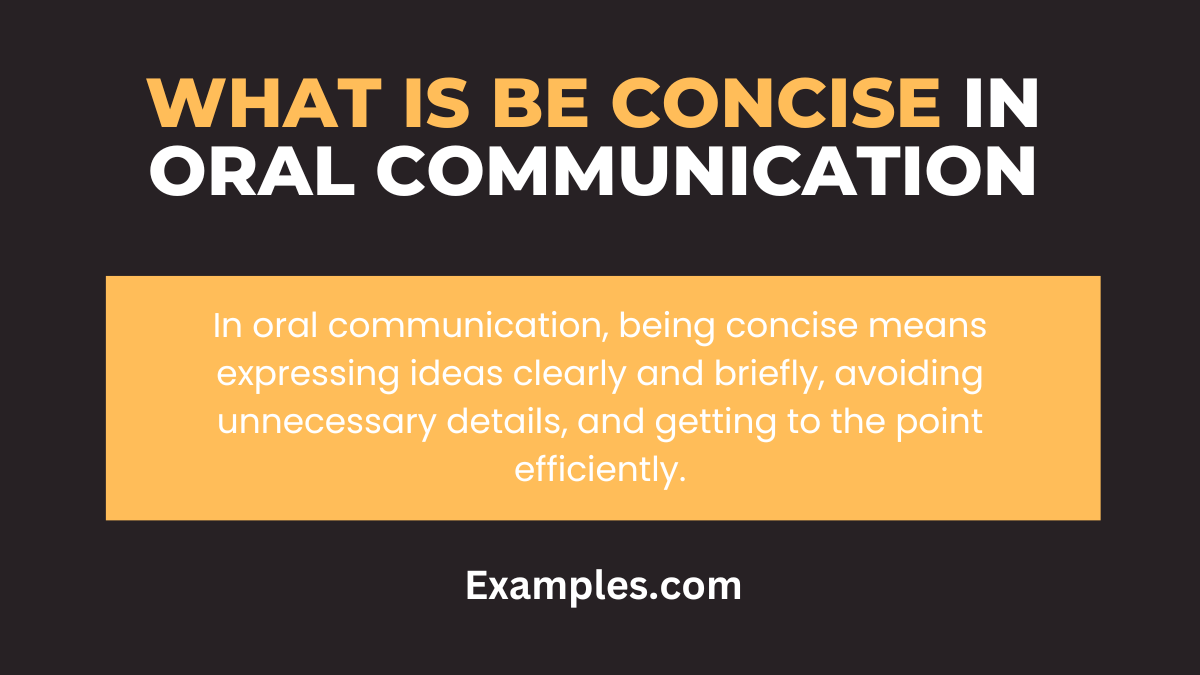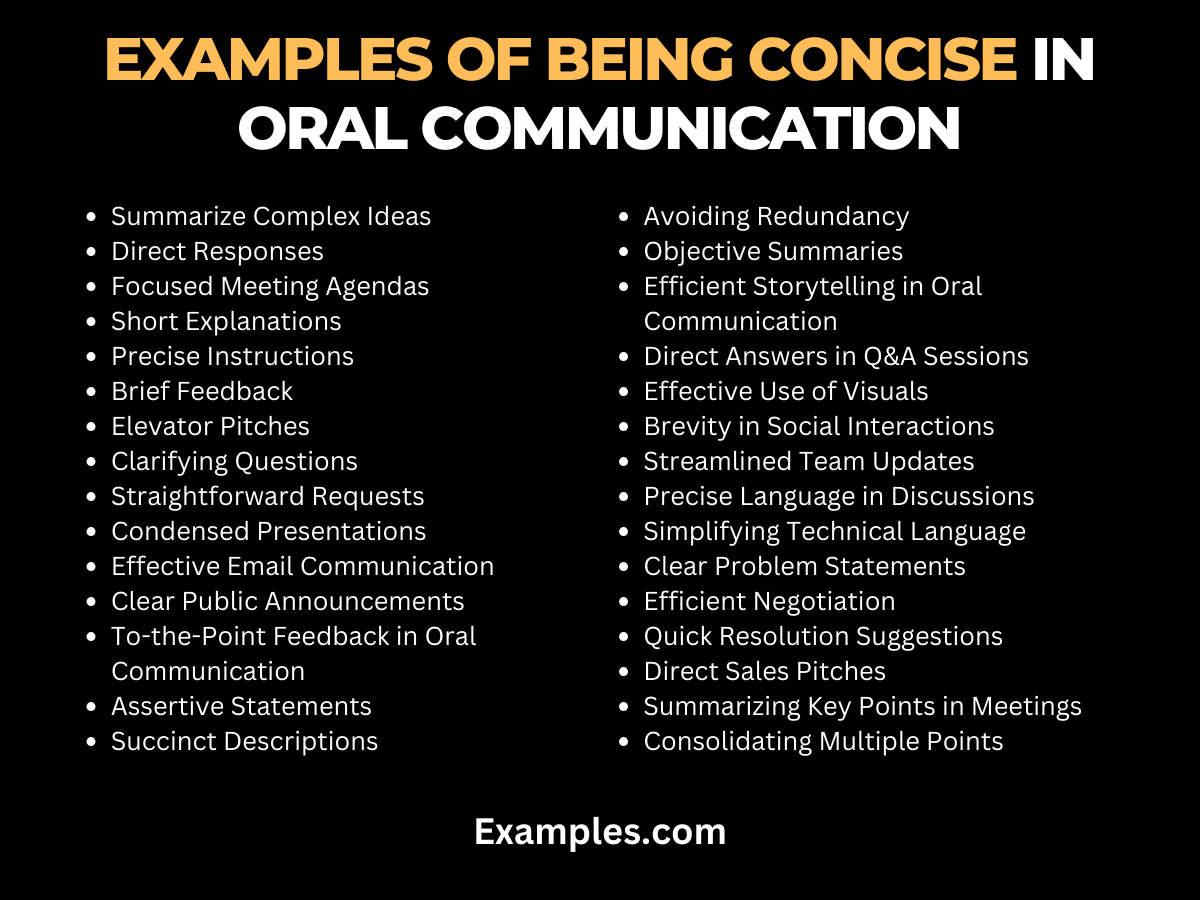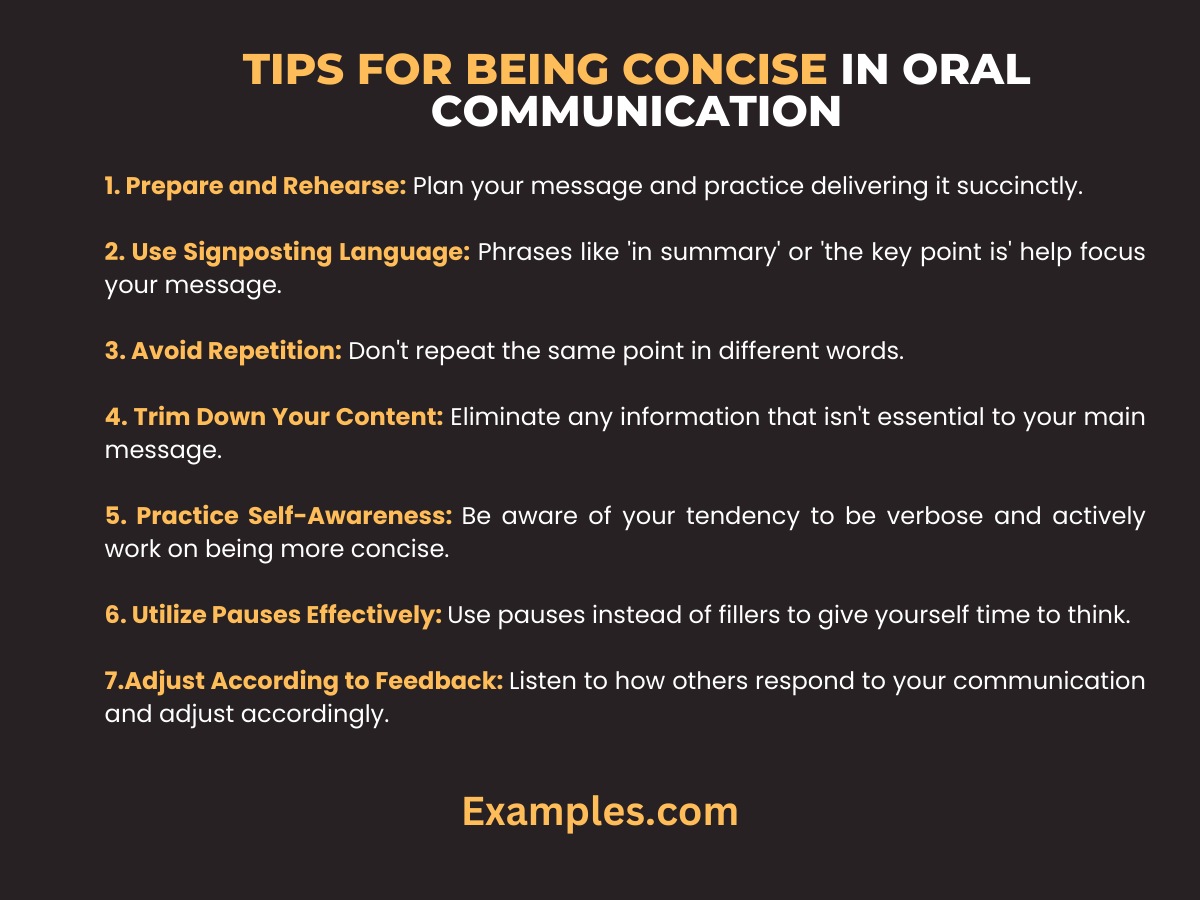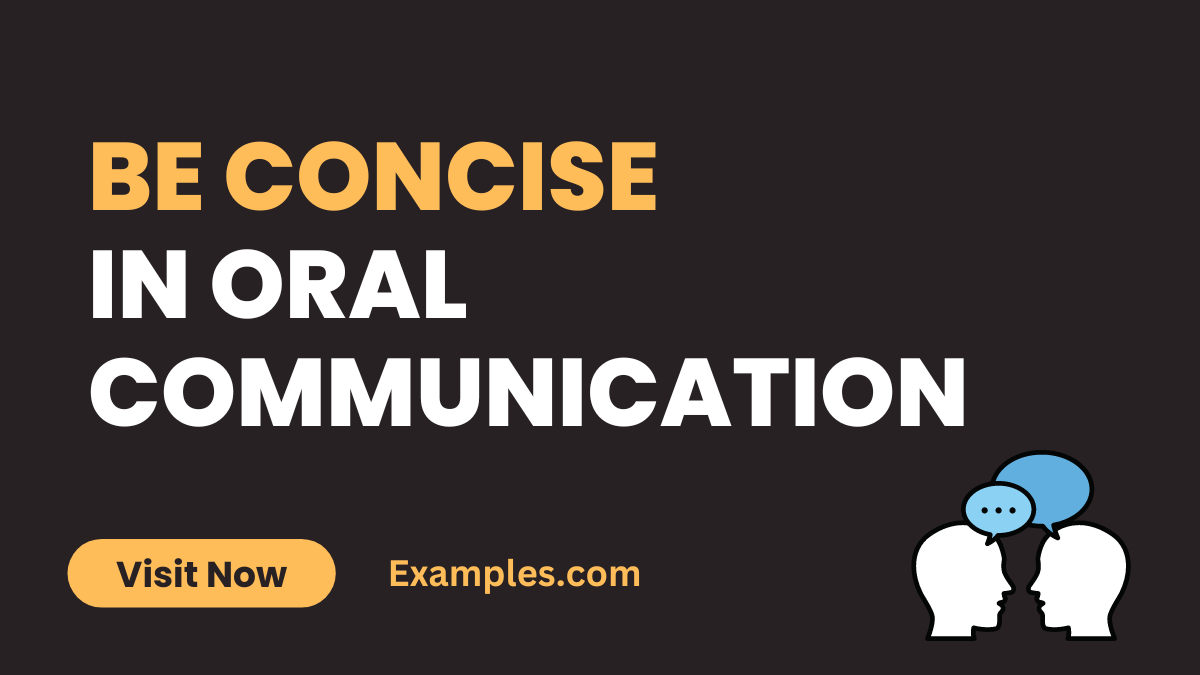29+ Be Concise in Oral Communication Examples
Being concise in oral communication is a pivotal component of regulation control communication skills. This approach centers around expressing thoughts and ideas succinctly and clearly, eliminating unnecessary verbosity. Conciseness in speech is not just about being brief; it’s about being impactful, ensuring that your message is conveyed effectively without overwhelming your audience. Mastering this skill enhances clarity, improves understanding, and makes you a more efficient communicator in diverse settings, from business meetings to everyday conversations.
What is Be Concise in Oral Communication

Being concise in oral communication means delivering your message in the most efficient way possible, using the fewest yet most effective words. It’s a skill that intertwines with active listening and clear speaking, allowing you to express yourself succinctly while ensuring the essence of your message remains intact. This method of communication is highly valued in both professional and personal settings, as it respects the listener’s time and attention, fostering more meaningful and productive interactions.
What is the Best Example of Be Concise in Oral Communication
A prime example of being concise in oral communication can be seen in professional settings where time is of the essence. For instance, during a business pitch, rather than delving into unnecessary details, a concise speaker would say, “Our product increases efficiency by 30%, reducing costs significantly.” This statement is straightforward, highlighting the key benefits without overloading the listener with information. It demonstrates an understanding of the audience’s needs and showcases the ability to communicate complex ideas simply and effectively.
30 Examples of Being Concise in Oral Communication

Being concise in oral communication is about delivering your message in a clear, straightforward manner without unnecessary elaboration. This skill, essential in effective communication, ensures your points are conveyed efficiently and understood easily. Conciseness prevents confusion, maintains audience engagement, and reflects confidence and clarity in your message. It’s a pivotal element in various communication settings, from public speaking to everyday conversations.
- Summarize Complex Ideas: “Our project aims to improve efficiency by integrating new technologies.” Simplifying a complex topic for easy understanding.
- Direct Responses: “Yes, I can complete the report by Tuesday.” Providing a clear, unambiguous answer.
- Focused Meeting Agendas: “Today’s meeting is to discuss the budget allocation only.” Setting a clear, singular topic for discussion.
- Short Explanations: “The error was due to a system update.” Explaining a problem without unnecessary details.
- Precise Instructions: “Please submit the file by 5 PM in the shared folder.” Giving clear, specific directions.
- Brief Feedback: “Your design is innovative, but consider simplifying the layout.” Offering concise, constructive criticism.
- Elevator Pitches: “Our app solves everyday financial tracking for small businesses.” Describing a complex service succinctly.
- Clarifying Questions: “Can you elaborate on the implementation phase?” Asking for specific information in a straightforward manner.
- Straightforward Requests: “Can you forward me the meeting minutes?” Making a simple, direct request.
- Condensed Presentations: “Our goal is to increase market share by 15% within a year.” Presenting the main objective without digression.
- Effective Email Communication: “Please review the attached document and provide your input.” Conveying the purpose of the email directly.
- Clear Public Announcements: “The event starts at 10 AM in the main auditorium.” Providing essential information without extra details.
- To-the-Point Feedback in Oral Communication: “Your report was thorough, but try to be more concise.” Encouraging brevity in communication.
- Assertive Statements: “I believe our focus should be on customer satisfaction.” Expressing an opinion clearly and confidently.
- Succinct Descriptions: “This tool automates our inventory management.” Describing a tool’s function in a simple manner.
- Avoiding Redundancy: “The meeting is postponed.” Communicating a change without unnecessary repetition.
- Objective Summaries: “In summary, we need to revise our marketing strategy.” Concluding discussions with a clear takeaway.
- Efficient Storytelling in Oral Communication: “Our company started with a small team, now we’re global leaders.” Telling a company’s history briefly.
- Direct Answers in Q&A Sessions: “Our product differs in its user-friendly design.” Responding to questions with focused answers.
- Effective Use of Visuals: “This graph shows our sales growth.” Using visuals to convey information concisely.
- Brevity in Social Interactions: “I enjoyed the event, especially the keynote speech.” Sharing experiences briefly and effectively.
- Streamlined Team Updates: “The project is on track for completion next month.” Updating status without unnecessary details.
- Precise Language in Discussions: “To increase efficiency, let’s automate this process.” Proposing solutions directly.
- Simplifying Technical Language: “This software optimizes data processing.” Explaining technical products in simple terms.
- Clear Problem Statements: “The main challenge is reducing operational costs.” Identifying issues without over-elaboration.
- Efficient Negotiation: “I propose a 10% discount for a faster delivery commitment.” Negotiating terms succinctly.
- Quick Resolution Suggestions: “Let’s resolve this by assigning clear roles.” Offering a solution in a straightforward way.
- Direct Sales Pitches: “Our service saves you time and money.” Selling a product with a simple message.
- Summarizing Key Points in Meetings: “To conclude, our priorities are product development and market research.” Wrapping up meetings with main takeaways.
- Consolidating Multiple Points: “In essence, we need better communication and more efficient processes.” Combining several ideas into one concise statement.
Steps to Being More Concise in Oral Communication
- Plan Your Message: Before speaking, organize your thoughts. This preparation helps you stay on topic and avoid unnecessary details.
- Practice Active Listening: By actively listening to others, you learn to understand key points quickly, a skill that helps in condensing your own messages.
- Use Simple Language: Avoid jargon and complex vocabulary. Simple language makes your communication clear and straightforward.
- Focus on Key Points: Identify the most important information you want to convey and stick to it.
- Eliminate Fillers: Work on removing fillers like ‘um’, ‘uh’, and ‘like’ from your speech, as they can dilute your message.
- Be Mindful of Your Audience: Understanding your audience allows you to tailor your message, making it more direct and concise.
- Practice Speaking: Regularly practicing your speaking skills can help you become more succinct and to the point.
- Seek Feedback: Encourage others to give you feedback on your communication style. This can help identify areas where you can be more concise.
Does Concise Speech Make You Credible and Magnetic
- Enhances Clarity: Concise speech is clear and to the point, making your message more understandable and credible.
- Shows Confidence: Being concise demonstrates confidence in your knowledge and communication skills, attracting and holding the audience’s attention.
- Respects Listeners’ Time: Concise communication shows you value the time of your audience, enhancing your appeal.
- Facilitates Better Engagement: A concise message is easier for audiences to engage with and respond to.
- Improves Retention: Concise points are easier to remember, making your message more impactful.
- Builds Authority: Being concise can position you as a thought leader who can articulate ideas efficiently.
- Encourages Active Listening: When you are concise, listeners are more likely to pay attention and engage.
- Adapts to Modern Attention Spans: Concise speech aligns well with contemporary shorter attention spans, making your communication more effective.
Importance of Being Concise in Oral Communication
- Efficient Communication: Conciseness allows for the transmission of ideas quickly and efficiently.
- Reduces Misunderstandings: Clear and brief messages leave less room for misinterpretation.
- Enhances Professional Image: Conciseness in your speech can make you appear more professional and prepared.
- Improves Interaction Quality: Concise communication often leads to more meaningful and focused interactions.
- Aids in Problem-Solving: Being concise helps in getting to the heart of issues faster, facilitating quicker problem resolution.
- Strengthens Arguments: Concise points are typically more persuasive and powerful.
- Facilitates Decision-Making: In business or meetings, concise information aids in clearer and faster decision-making.
- Improves Relationships: Clear and concise communication can lead to healthier personal and professional relationships.
Tips for Being Concise in Oral Communication

- Prepare and Rehearse: Plan your message and practice delivering it succinctly.
- Use Signposting Language: Phrases like ‘in summary’ or ‘the key point is’ help focus your message.
- Avoid Repetition: Don’t repeat the same point in different words.
- Trim Down Your Content: Eliminate any information that isn’t essential to your main message.
- Practice Self-Awareness: Be aware of your tendency to be verbose and actively work on being more concise.
- Utilize Pauses Effectively: Use pauses instead of fillers to give yourself time to think.
- Adjust According to Feedback: Listen to how others respond to your communication and adjust accordingly.
- Focus on Active Listening: By being a good listener, you can better understand how to convey your message concisely.
In conclusion, the skill of being concise in oral communication is not just about efficiency; it’s a key factor in personal and professional growth. Conciseness aids in delivering messages that are clear, impactful, and respectful of the audience’s time. This practice is crucial in business settings where effective communication is synonymous with problem-solving and relationship-building. It allows for clearer thinking, better decision-making, and more persuasive presentations.
Moreover, concise communication plays a significant role in personal development. It helps in articulating thoughts and feelings precisely, leading to stronger relationships and better conflict resolution. By practicing concise communication, individuals can become more expressive, enhance their listening skills, and foster a deeper understanding of others. This process not only aids in personal growth but also contributes to building a more empathetic and connected society.
For further reading on the importance of communication in business, visit Fundamentals of Business Communication by BCcampus. Additionally, to explore more about the role of communication skills in personal development, consider visiting SoME Education for insightful tips and guidance



